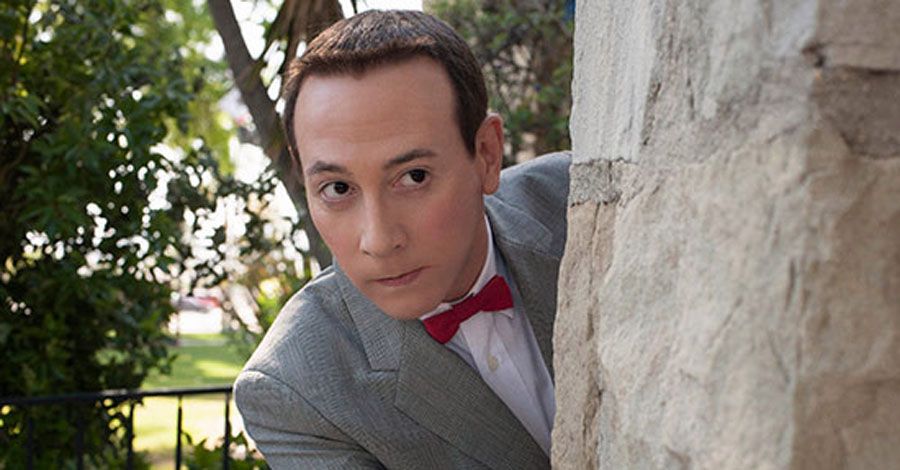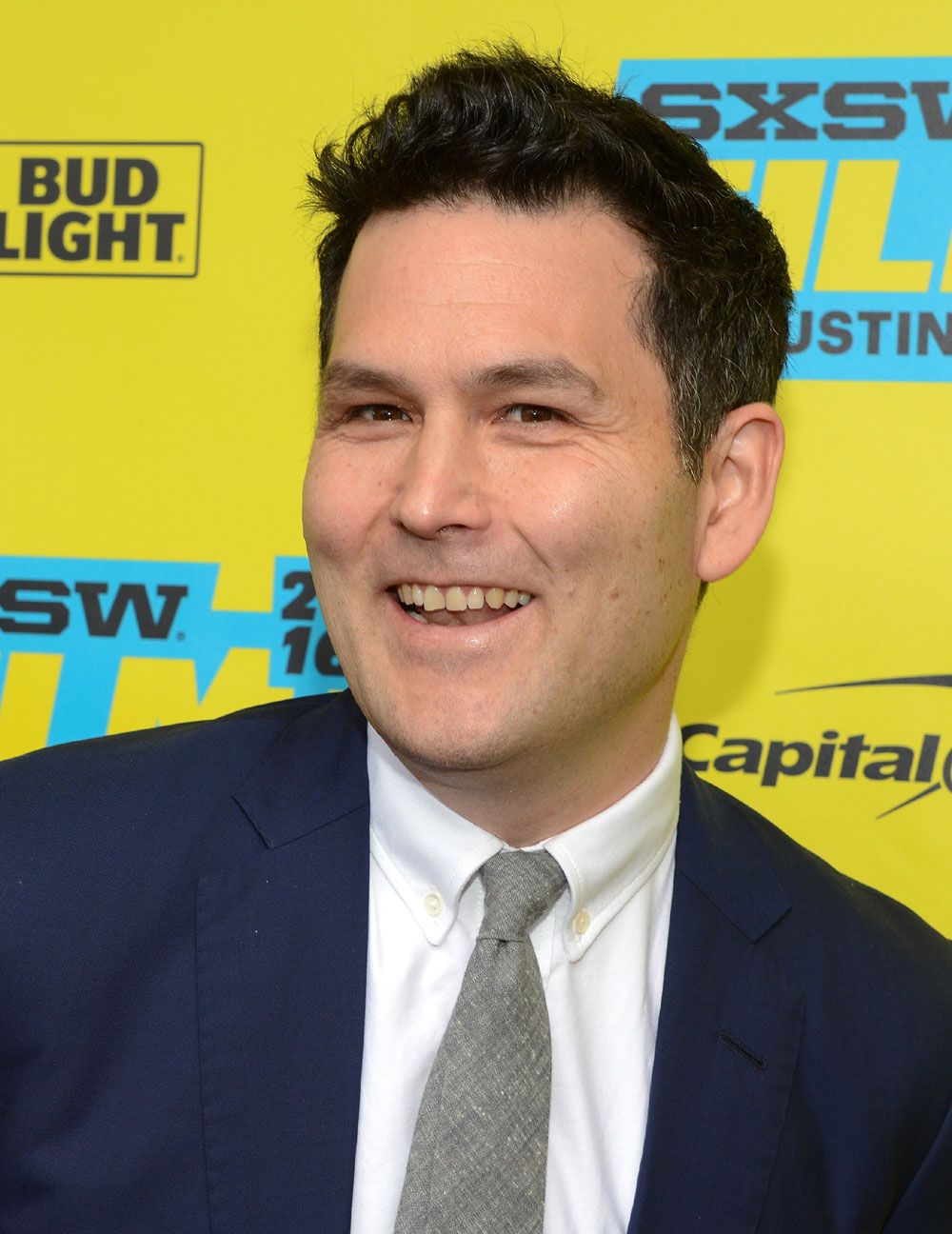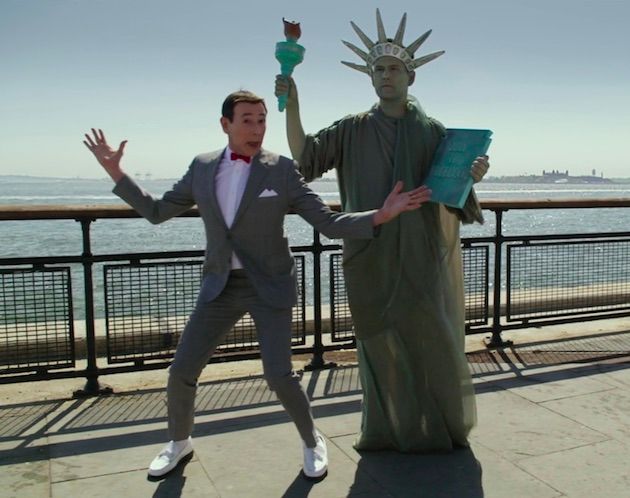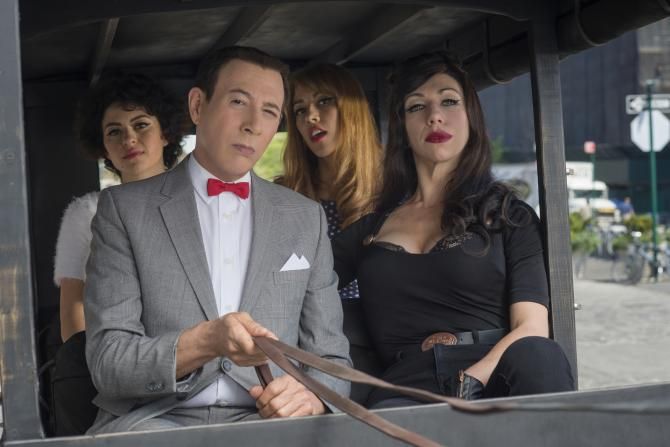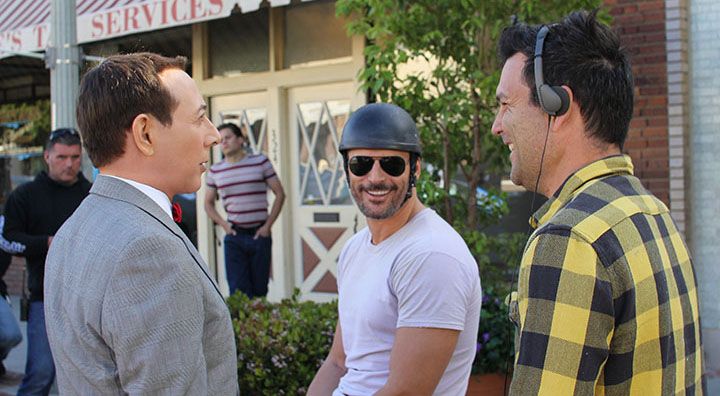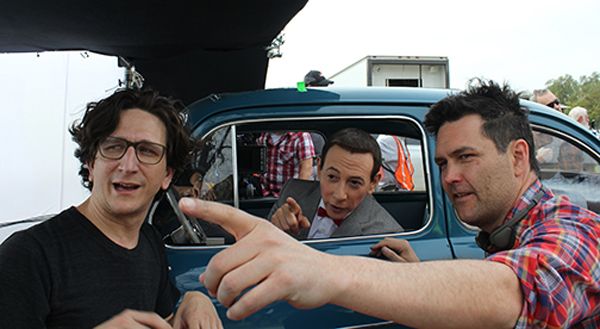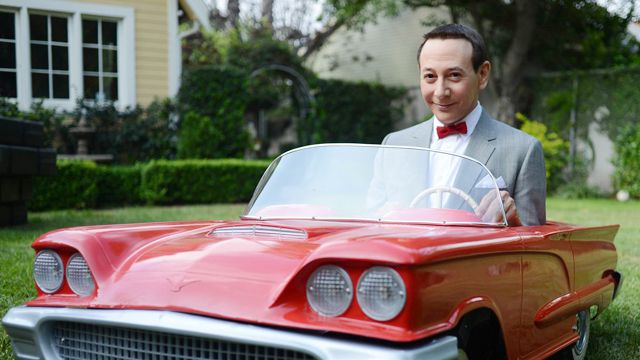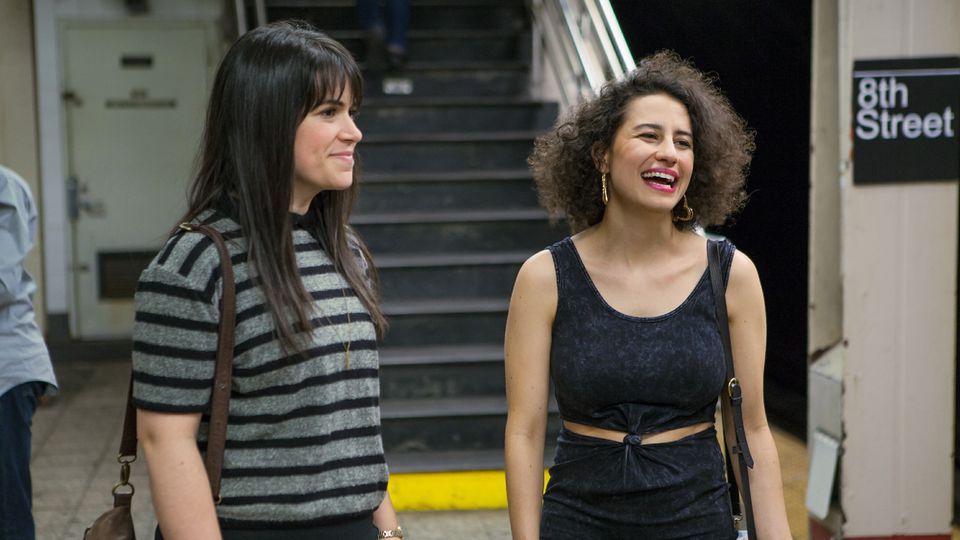Co-creator of the envelope-pushing "Wonder Showzen" and director of episodes of "Jon Benjamin Has a Van," "Inside Amy Schumer" and "Broad City," John Lee is a master of daring humor. So who better to help Paul Reubens revive Pee-wee Herman in the character's first film in 28 years?
Following the rousing world premiere of "Pee-wee's Big Holiday" at SXSW, and the movie's Netflix debut, SPINOFF spoke with Lee about his comedy philosophy, the unique challenges of taking on Pee-wee's world, and what unlikely project he'd like to tackle next.
Our interview began with commiseration over the distinctly exhausting/exhilarating demands of SXSW then reveling in our shared pride as fellow New Yorkers. While we'd typically trim such chit-chat from interviews, Lee's outspoken love of New York proved a major element of the finale of "Pee-wee's Big Holiday." So we'll pick up with Lee revealing the hardest part of making this, his first feature-length film.
John Lee: I spent a year out in Los Angeles making this movie, and it was miserable.
Spinoff: Oh, man!
I mean, it was joyous to be making a Pee-wee Herman movie, but to be out in Los Angeles, where basically everyone goes, "So are you moving out here? The weather is great!" And I'm like the weather? If the weather defines your culture, then you're maybe just one better than Florida. And that's what you're saying. You're going on record that L.A. is just a little bit better than Florida.
Yeah, we don't have good weather in New York. But I don't care.
Yeah! You know what we have? We have honesty. We have actual criticism. We have opinions.
We have a lot of opinions.
Yeah! People [in Los Angeles] would not talk about anything.
I was thrilled because at the end of "Pee-wee's Big Holiday," Pee-wee does get to dance around New York!
Yes, that was in the script, and the line producer was talking about, "Can we shoot this in downtown Los Angeles?" And I was like, "No!" I went on the tours of all the lots' New York [sets], because I also just wanted to see them -- I just cracked up each time. They go, "This is the New York!" And I just start laughing, being like, "Oh, that's great." I'm looking around and they're like, "Do you like it?" And I'm like, "No. No, this is terrible! Look how dumb this looks!" Basically, I made the argument that no one could beat, which is in the trailer you actually see him in New York, then every other scene seems so much larger. And they're like "Oh, right." So, yeah, let's spend just two days in New York, and we'll run around like mad men, shooting all this stuff and it'll be great! So some of them have personal meaning to me. Some of them are homages to "How to Marry a Millionaire," because that's what that whole segment is in homage to. Well, it's not a homage, it's basically a lift from that movie. So, I was really happy, and my friends got to work on it.
That's rad! So what was a personal moment for you in that sequence?
Well, I'm in it.
Oh! Are you? I missed that.
Yeah. I'm the Statue of Liberty. That's pretty personal.
That's really cool!
Yeah, I got tickled by Pee-wee. [Paul Reubens] kept asking me to be in it, and I kept being like, "I don't know." And he was like, "Come on, at least in New York." And I thought, "OK, I'll play [the guy dressed as] the Statue of Liberty," just 'cause I think New York is so much better than Los Angeles.
Were you getting inundated with requests from the comedians you've worked with to get parts in the movie?
Uhhhh, yeah. I just didn't look at those because then I'd feel bad. I didn't want to put recognizable people in there. It's better just not to acknowledge --
You're like, "My phone's being weird. It's deleting messages! I don't know."
Yeah! "I don't know what happened. I got to get a new iPhone."
I want to talk about the casting, particularly of the kind of Switchblade Sisters, Freckles, Pepper and Bella.
Oh, yes! That was the casting -- like, we had to make the coolest girl band available. Like, that's how I thought of them, like a girl band. We did this thing where we liked five people, so we had them all come in as a group in different forms to see how it would work. Because it's kind of like The Monkees -- you have to see them all together to see if it works.
"Pee-wee's Big Holiday" Writer Paul Rust Reveals Secrets to Reviving an '80s Icon
When we did this switch, Stephanie [Beatriz], who plays Freckles, she was also being considered for another one of the girls. And I said, "Hey can you just try Freckles just for this one scene and you two switch," and just instinctually in that audition she did this dumb thing in the middle of a scene where she ducked down, just fell to the floor because she was hiding! Which no one will do in a casting because everyone wants to be sure they're being videotaped and are on camera. But she made this choice, and I just looked under the table to see what she was doing, and as I was looking, I was like, "Oh, she won because she's making me looking at her!" And she was just so funny and crazy that it was really fun.
That was a really fun casting, but a difficult casting because you're trying to make a cool band. And then of course there's the homage to Russ Meyer in their costumes, and their whole demeanor is very apparent. They did a great job.
It's funny with Stephanie, on "Brooklyn Nine-Nine" I don't think I've ever seen her smile, so I didn't even recognize her here!
Yeah, I talked to her about this. I don't know that show that much, but I'd seen her in "Short Term 12," which is a great little movie. And then on this movie she would come to set and she was just so goofy! She's like a nutball. I'm like, "Oh, you don't ever get to do this, do you?" And she's like, "Noooooo!" She's like a crazy sugared-up puppy.
I couldn't place her, and when I saw her name in the credits, I was like, "What!?"
I'm happy about that. And Alia [Shawkat], who I think is great, she's really good in this movie. I was so considerate with her casting because I didn't want to fill the movie with recognizable people. But she was so good in the role, and she's such a great actress in an underrated dramatic way. She really does the drama; she's great. As much as I didn't want to cast her, I had to cast her because she really was so good in the role and the audition and she's so smart. She's such a strange professional.
And then Jess [Pohly], Paul [Reubens] and I saw her tape -- at first you cast by tapes and then you call people in. She started the audition with her back to the camera. And we're like, "Uh-oh, this is a terrible choice," and then she turns around and delivers her first line and it was just like, "Ding!" It was like love at first sight! We're just like, "Oh she wins!" She's just, like, so interesting-looking. She's tough, but you can see that there's something vulnerable behind it. She was great. They all were, they were perfect for it.
I'd like to talk about how one scene in particular went from page to screen, because describing the balloon scene, it doesn't sound all that funny. But its execution had me in hysterics.
To me it's like Jerry Lewis. It's a throwback to that kind of comedy. I describe Jerry Lewis' kind of comedy as -- I don't know the person who said this, but this is someone else's words: You're in a car with Jerry Lewis, and then he pulls off the first exit and gets back on to the highway. And you're a little confused. Then he pulls off to the second exit and he gets back on, and you're like, "What the hell's going on?" And by the fifth exit, you're laughing. By the 20th exit, you're totally cracking up. By the 40th exit, you're exhausted. You're like, "What the fuck. This needs to stop." By exit 70, you're like, "I'm going to jump out of the car." By exit 150, you're like, "Please pull off. We have to pull off." And you're like celebrating. And to me, it's just this one long take of a man blowing up a balloon and doing a little whiny noise as he lets the air out, and you're just watching a performance piece. You're watching performance art.
No movie will do that anymore. No movie will let you just let you sit in something that feels like you're watching a Marx Brothers movie, where you're just watching comedic masters do something that's just like watching a live experience. It captures that feeling of both "Oh, my God, is this really happening? He's literally just blowing up a balloon? And he's literally just letting the air out?" And you have to give up. You just have to. And if you don't give up, then I would just never be friends with you. Like, Paul/Pee-wee would not like you. So that's your choice to make. If you want decide that's not funny, then make that choice. That's fine. But just know we would never even consider you a human.
This just became a really intense litmus test.
Yeah! I think it is kind of what it is. To me, that's what comedy is sometimes. It is a litmus test.
You've worked on a lot of comedy shows, but were you at all intimidated coming into something so iconic?
I was less intimidated than I was worried that I did a good job, that my interpretation of Pee-wee Herman is the one that I think is good for this movie. I think there's a bunch of different versions of Pee-wee, and I think in the movies he has a different character than in the kids' shows. And so that was my big worry. He's an iconic character. He's so optimistic. He's important to people in ways that I don't know that other comedy is.
Like, you meet people -- like in the crew or people who would come visit the set because they hear there's a Pee-wee movie -- you can see they're welling up. And they are talking about how tough their lives were, but that his movies and his kids' show pulled them through some dark times. And you can tell they totally mean it. And I lived it. Like, I didn't have their experiences, but I had the experience of, like, he was down the hall and opened the door, like, "Hey, come check out this world." And then you go down there like "Willy Wonka and the Chocolate Factory" and it's like, "Oh, my God, right! There's this whole world of American crazy dark criticism surrealism that's going on." And he's like, "Come on, this is going to be great." Like, "Raise your freak flag high! And I'm here to show you how to do it, or show you that it's OK to do it."
I think that importance, I felt that on my shoulders like a big, giant gorilla. I went to work, I studied and I did my homework, and really worked on jokes and did my job.
For you, what's the defining edict of what would work for Pee-wee versus what wouldn't?
An example in the movie is when he's about to get married and he says, "Excuse me, what's that? Oh, I hear nature calling." And he backs out of the chapel and walks down the steps, and like a terrible salesman he's just smiling the whole time. To me, that's a Pee-wee Herman moment that most people would cut out. Most actors wouldn't walk out of a room like that. Only Pee-wee would. I always fought for that, like "This has got to stay in. This is him." I was really happy that it got big laughs [at the SXSW premiere], because he gets to have his cake and eat it too. Which I've never understood that saying, because what's the point of cake if not for eating it?
So you get the cheesiness of it, the dumbness of it, but you get to watch the performance of it. So, to me that part of the movie to me represents what distinguishes Pee-wee from anyone else. And then on the other end: He never gets nasty. He can get emotional and angry and upset, but he's not necessarily a mean person. So, that's the other half of him. And I like it when he gets a little upset and a little aggressive. I like that Pee-wee Herman because it's like a more full and much richer Pee-wee Herman to me.
I was actually really relieved watching "Pee-wee's Big Holiday," because we've been getting a lot of comebacks from "The Muppets" to "Ghostbusters" to "Fuller House." And it seems that sometimes when people want to bring something back they feel the need to turn it "edgy."
Yeah, I agree. All the criticisms that I think are so inherent to the movies are so kind of obvious. Wouldn't you think they'd test that? Wouldn't you think the people making this would understand that? But some people just assume other people aren't that smart. And I certainly didn't want to do that. I pushed that with Paul in moments. But I certainly didn't want to make like "Where's Pee-wee now?" Or I didn't want to make this like darker and stylized like a modern movie. It didn't seem to honor the character, or what Paul is about. To me he's such an artistic person and a classic person, and I just wanted to honor that. That version of the movie would be so proud of itself you would just want to vomit.
I'm curious what it was like working with Netflix as a studio, because their productions are so diverse.
They feel like they have this giant net that they're just trying to catch something with. And you meet 'em and they're like anyone else. Like, you know, I want to see a good horror movie but I also want to see a comedy. But then I also want to see like a weird crime drama. Like, my top five movies are all in different, and from all different, places. And you're like, "Oh, right, because they're all just human." They like what they like. So they don't have a specific viewpoint like Adult Swim, which I love and I work for and they're great. But you know, that couldn't be the only channel in the world.
So that's what Netflix is like. They are super supportive. They gave us money. We needed more money; we explained it. They gave us more money. They came to set just like, "Oh, I just wanted to see this scene!" Not like professionals of like "What's going on? Let me make sure people know who I am." I've made all these weird shows my whole career where I've had all this creative freedom, and it felt no different [working on "Pee-wee's Big Holiday"], which I was super-worried about that. And every step of the way, they were just super cool and kind and thoughtful human beings. It was great.
That's incredible. I have to tell you that you directed my favorite episode of "Broad City," which is "Pu$$y Weed." It destroys me.
Oh, thank you! That is a very fun show. Abbi and Ilana are so fun to work with. And my approach to that show is -- and I think my approach to most comedy is -- just shoot it like a drama. You know? Don't get in their way.
What does that mean "to shoot it like a drama"?
Not shoot it for comedy. It's the emotion first. For me, it's all about the emotion. Like, what's the emotion in the scene? I think in comedy a lot of people shoot for the punchline. They want to make sure the rhythm of the punchline is big and, "Hey, here's the punchline!" Where I'm like, "What's the setup?" Like, to me the setup is way more important.I want to find out what the emotion of the setup is so when they cut to the person who's upset or the person who is gleeful in the wrong moment, you teed that up. And I also like to do slight little push-ins that make it feel like you're watching a drama, but when it is in a comedy it has this emotion. I try to bring out as much emotion in comedy as possible, whether it be their anger or upsetness or seriousness, as opposed to when everything is light. You know? Like, even when they're supposed to be taking something seriously it's all easy-peasy. Whenever I see something like that, I'm like, "Well, then I don't care either. You don't care; I don't care." Does that make sense?
Totally. It sounds like a cinematic approach to doing TV comedy. Are you lining up any other films?
I'm telling everyone that I'm doing the Morrissey movie, the biopic, just because I want that to come true.
Would that be a drama? Or a comedy you'd shoot like a drama?
He's a hero of mine, Morrissey. And everyone is like, "Oh, my God, I just hate his complaining." I've always thought of him as a great comedian. Like, I got that he's emotional, but I also like got that he was so emotional that it was nonsense and comedic. And I think that's true … I think I might be the right person to make that movie, and I also met him once.
I like that as a pitch, you're like, "Look, what everyone doesn't get about Morrissey …"
Yeah, is "He's hilarious."
That's a very Brooklyn approach.
(Laughs) It is very Brooklyn. It's very East Coast for us to be sarcastic about emotions.
Which again is funny, because Pee-wee is so sincere and earnest! "Pee-wee's Big Holiday" rejects that kind of cynicism.
Yeah. To put it in political terms, he's the opposite of Donald Trump, for sure.
Wow. I hadn't thought of it like that.
Yeah. I think that the people who like it are understanding that this is a full family movie, for adults and for children. And it has emotion. The success of the of the movie for me is that I was able to make people laugh and then ten seconds later well up. Like they go from this shot of like, "Oh, my God, the tree house! Oh, Pee-wee! That's so sweet." And then you cut to the inside where these two giant men are inside this tiny house, and you laugh, but then you have this sweet little moment about root beer barrels, where you're like Awwww! They ping-pong back and forth, but it doesn't feel odd. It feels honest to the character to the story. So I'm glad that the people who are liking it are noticing the difference between that and not wanting to make the "updated" Pee-wee movie or the "look how cool he is now" version. Which I would just -- what would be the point? I'd want to throw that movie in the Hudson!
"Pee-wee's Big Holiday" is now available on Netflix.

